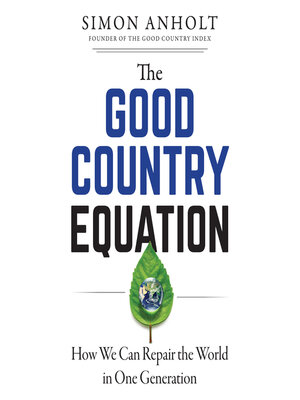
Sign up to save your library
With an OverDrive account, you can save your favorite libraries for at-a-glance information about availability. Find out more about OverDrive accounts.
Find this title in Libby, the library reading app by OverDrive.



Search for a digital library with this title
Title found at these libraries:
| Library Name | Distance |
|---|---|
| Loading... |
Why doesn't the world work? Why, despite all the power, technology, money and knowledge that humanity has accumulated, are we are still unable to defeat global challenges like climate change, war, poverty, migration, extremism, and inequality?
Simon Anholt has spent decades helping countries from Austria to Zambia to improve their international standing. Using colorful descriptions of his experiences—dining with Vladimir Putin at his country home, taking a group of Felipe Calderon's advisors on their first Mexico City subway ride, touring a beautiful new government hospital in Afghanistan that nobody would use because it was in Taliban-controlled territory—he tells how he began finding answers to that question.
Ultimately, Anholt hit on the Good Country Equation, a formula for encouraging international cooperation and reinventing education for a globalized era. Anholt even offers a "selfish" argument for cooperation: he shows that it generates goodwill, which in turn translates into increased trade, foreign investment, tourism, talent attraction, and even domestic electoral success. Anholt insists we can change the way countries behave and the way people are educated in a single generation—because that's all the time we have.
Simon Anholt has spent decades helping countries from Austria to Zambia to improve their international standing. Using colorful descriptions of his experiences—dining with Vladimir Putin at his country home, taking a group of Felipe Calderon's advisors on their first Mexico City subway ride, touring a beautiful new government hospital in Afghanistan that nobody would use because it was in Taliban-controlled territory—he tells how he began finding answers to that question.
Ultimately, Anholt hit on the Good Country Equation, a formula for encouraging international cooperation and reinventing education for a globalized era. Anholt even offers a "selfish" argument for cooperation: he shows that it generates goodwill, which in turn translates into increased trade, foreign investment, tourism, talent attraction, and even domestic electoral success. Anholt insists we can change the way countries behave and the way people are educated in a single generation—because that's all the time we have.







